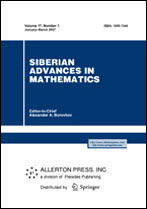|
This article is cited in 8 scientific papers (total in 8 papers)
Random Walks in the Positive Quadrant. I. Local Theorems
A. A. Mogul'skiia, B. A. Rogozinb
a Sobolev Institute of Mathematics, Siberian Branch of the Russian Academy of Sciences
b Omsk Branch of Sobolev Institute of Mathematics, Siberian Branch of the Russian Academy of Science
Abstract:
In the article, we consider a two-dimensional random walk $S(n)=S(\gamma,n)$, $n=1,2,\dots$, generated by the sequence of sums $S(\gamma,n)=\gamma+\xi(2)+\dots+\xi(n)$ of independent random vectors $\gamma,\xi(2),\dots,\xi(n),\dots$, with initial random state $\gamma=S(\gamma,1)$; in addition, we assume that the vectors $\xi(i)$, $i=2,3,\dots$, have the same distribution $F$ that differs in general from the distribution ${}\,\overline{\!F}$ of the initial state $\gamma$. We study boundary functionals, in particular, the state of the random walk at the first exit time from the positive quadrant.
In the first part of the article, we obtain factorization identities (Theorem 1.1) and as a corollary give a limit theorem for the state $S(\gamma,n)$ of the random walk at the exit time from the positive quadrant under the condition that the value $n$ of this time tends to infinity (Theorem 1.4).
Key words:
random walk, boundary problem, factorization identity.
Received: 13.08.1996
Citation:
A. A. Mogul'skii, B. A. Rogozin, “Random Walks in the Positive Quadrant. I. Local Theorems”, Mat. Tr., 2:2 (1999), 57–97; Siberian Adv. Math., 10:1 (2000), 34–72
Linking options:
https://www.mathnet.ru/eng/mt154 https://www.mathnet.ru/eng/mt/v2/i2/p57
|


| Statistics & downloads: |
| Abstract page: | 428 | | Full-text PDF : | 150 | | First page: | 1 |
|





 Contact us:
Contact us: Terms of Use
Terms of Use
 Registration to the website
Registration to the website Logotypes
Logotypes








 Citation in format
Citation in format 
